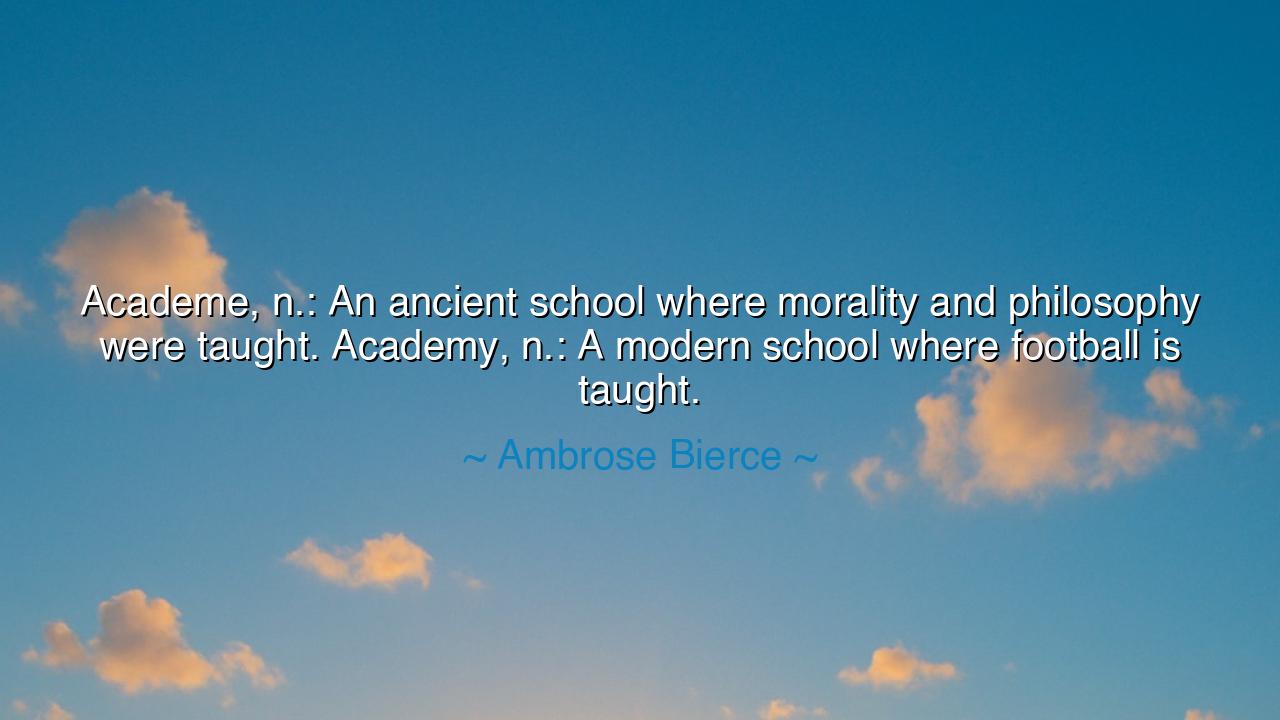
Academe, n.: An ancient school where morality and philosophy
Academe, n.: An ancient school where morality and philosophy were taught. Academy, n.: A modern school where football is taught.






When Ambrose Bierce, the sharp-tongued satirist of the nineteenth century, defined “Academe, n.: An ancient school where morality and philosophy were taught. Academy, n.: A modern school where football is taught,” he wielded his pen like a sword. In these words, he lamented the decline of noble learning into trivial spectacle, mocking a society that seemed to value games of strength more than the cultivation of wisdom. For Bierce, who wrote The Devil’s Dictionary, definitions were weapons—satirical arrows aimed at the heart of human folly. This remark, cloaked in wit, is in truth a cry of grief: that institutions once dedicated to the pursuit of truth had become temples of entertainment.
The origin of this saying lies in the contrast between the Academe of Plato and Aristotle—the sacred groves where philosophy, virtue, and reason were pursued—and the Academies of Bierce’s America, where universities often glorified athletics above the disciplines of the mind. In Athens, men gathered in the shade of olive trees to debate justice, beauty, and the nature of the soul. But in Bierce’s day, and even more so in ours, academies often found their greatest cheers not in the lecture hall, but on the football field. His satire pierced this truth: we had traded the pursuit of wisdom for the roar of the crowd.
The ancients themselves would have understood the danger. Plato warned that when a society neglects philosophy, it drifts into chaos, for without reflection, power becomes tyranny, and desire becomes ruin. Imagine if Socrates, instead of teaching virtue, had coached young men only to tackle harder and run faster. What would Athens have become? Bierce, in his biting way, asked the same question of his age: what will happen to a nation whose schools no longer prize wisdom, but spectacle?
Consider the real story of college football in the United States at the turn of the twentieth century. The game was violent, often deadly, yet it grew rapidly in popularity. Universities, seeking fame and wealth, built massive stadiums, while professors and philosophers were pushed aside. President Theodore Roosevelt himself had to intervene in 1905 to reform the sport after fatalities mounted. Bierce, who saw the world with cynical clarity, recognized this shift before many others. To him, the academy was no longer a sanctuary of the mind, but an arena of blood and noise.
The lesson is clear: we must not allow the pursuit of wisdom to be overshadowed by the pursuit of entertainment. Games and contests have their place—they build strength, loyalty, and joy—but they must never become the central altar of education. True greatness lies not in how far one can throw a ball, but in how deeply one can think, how nobly one can live, and how courageously one can act in pursuit of truth.
What then must we do? First, honor both body and mind, but give primacy to the mind, for it guides the body and gives meaning to strength. Second, guard our institutions of learning so they remain temples of truth, not merely stadiums of applause. Third, cultivate in ourselves and our children a love of wisdom, so that we do not grow into a people who cheer the loudest but think the least.
Thus, Ambrose Bierce’s satirical definition endures: “Academe… where morality and philosophy were taught. Academy… where football is taught.” It is a reminder wrapped in jest, a warning disguised as laughter. Let us not forget the groves of Plato, nor the dialogues of Socrates, nor the wisdom that sustains civilizations. For games will fade, crowds will scatter, but the truths of philosophy and the discipline of morality endure through all ages. To honor those truths is to honor the very soul of humanity.






AAdministratorAdministrator
Welcome, honored guests. Please leave a comment, we will respond soon